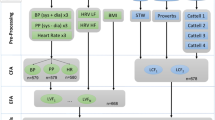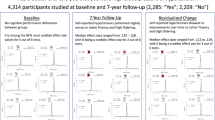Abstract
Objective:
To examine the potential interactive relations of central versus total obesity and blood pressure (BP) to cognitive function.
Method:
In all, 90 healthy, stroke, and dementia-free middle-aged and older adults (ages 54–81 years; 63% male; 93% White) underwent biomedical and neuropsychological assessment. Relations of central obesity (assessed by waist circumference (WC)) and systolic or diastolic BP to cognitive function were examined in multiple regression models. Next, body mass index (BMI) was substituted for WC in the models.
Results:
After statistical adjustment for age, education, gender, and other potential confounders including components of the metabolic syndrome (depending on the model), significant interactions of WC and systolic (or diastolic) BP were noted for the Grooved Pegboard – Dominant Hand and Stroop Interference scores, with marginally significant results for Grooved Pegboard – Nondominant Hand. In general, individuals with greater WC and higher BP performed most poorly on these measures. Similar results were obtained for BMI.
Conclusion:
Independent of other confounders including facets of the metabolic syndrome, the combination of greater WC (or BMI) and higher (systolic or diastolic) BP was associated with diminished performance on tests of motor speed and manual dexterity, and executive function (i.e. response inhibition) accounting for 3–13% of the variance in these measures. In healthy older adults, there are similar, negative relations of central and total obesity to cognitive function that are potentiated by higher BP levels.
This is a preview of subscription content, access via your institution
Access options
Subscribe to this journal
Receive 12 print issues and online access
$259.00 per year
only $21.58 per issue
Buy this article
- Purchase on Springer Link
- Instant access to full article PDF
Prices may be subject to local taxes which are calculated during checkout

Similar content being viewed by others
References
Kurth T, Gaziano JM, Berger K, Kase CS, Rexrode KM, Cook NR et al. Body mass index and the risk of stroke in men. Arch Intern Med 2002; 162: 2557–2562.
Rosengren A, Wilhelmsen L, Lappas G, Johansson S . Body mass index, coronary heart disease and stroke in Swedish women. A prospective 19-year follow-up in the BEDA study. J Cardiovasc Risk 2003; 10: 443–450.
Song YM, Sung J, Davey Smith G, Ebrahim S . Body mass index and ischemic and hemorrhagic stroke: a prospective study in Korean men. Stroke 2004; 35: 831–836.
Gustafson D, Rothenberg E, Blennow K, Steen B, Skoog I . An 18-year follow-up of overweight and risk of Alzheimer disease. Arch Intern Med 2003; 163: 1524–1528.
Haan MN, Wallace R . Can dementia be prevented? Brain aging in a population-based context. Annu Rev Public Health 2004; 25: 1–24.
Kilander L, Nyman H, Boberg M, Lithell H . Cognitive function, vascular risk factors and education: a cross-sectional study based on a cohort of 70-year-old men. J Intern Med 1997; 242: 313–321.
Sorensen TI, Sonne-Holm S, Christensen U, Kreiner S . Reduced intellectual performance in extreme overweight. Hum Biol 1982; 54: 765–775.
Elias MF, Elias PK, Sullivan LM, Wolf PA, D'Agostino RB . Lower cognitive function in the presence of obesity and hypertension: the Framingham heart study. Int J Obesity Relat Metab Disord 2003; 27: 260–268.
Droyvold WB, Midthjell K, Nilsen TI, Holmen J . Change in body mass index and its impact on blood pressure: a prospective population study. Int J Obes Relat Metab Disord 2005; 29: 650–655.
Lewington S, Clarke R, Qizilbash N, Peto R, Collins R, Prospective Studies Collaboration. Age-specific relevance of usual blood pressure to vascular mortality: a meta-analysis of individual data for one million adults in 61 prospective studies. Lancet 2002; 360: 1903–1913.
Meyer JS, Rauch GM, Rauch RA, Anwarul H, Crawford K . Cardiovascular and other risk factors for Alzheimer's disease and vascular dementia. Ann NY Acad Sci 2000; 903: 411–423.
Waldstein SR, Manuck SB, Ryan CM, Muldoon MF . Neuropsychological correlates of hypertension: review and methodologic considerations. Psychol Bull 1991; 110: 451–468.
Waldstein SR, Katzel LI . Hypertension and cognitive function. In: Waldstein SR, Elias MF (eds). Neuropsychology of Cardiovascular Disease. Lawrence Erlbaum Associates: Mahwah, NJ, 2001. pp. 15–36.
Elias MF, Wolf PA, D'Agostino RB, Cobb J, White LR . Untreated blood pressure level is inversely related to cognitive functioning: the Framingham Study. Am J Epidemiol 1993; 138: 353–364.
Shen BJ, Todaro JF, Niaura R, McCaffery JM, Zhang J, Spiro III A et al. Are metabolic risk factors one unified syndrome? Modeling the structure of the metabolic syndrome X. Am J Epidemiol 2003; 157: 701–711.
Expert Panel on the Identification, Evaluation, and Treatment of Overweight in Adults. Clinical guidelines on the identification, evaluation, and treatment of overweight and obesity in adults: executive summary. Am J Clin Nutr 1998; 68: 899–917.
Suk SH, Sacco RL, Boden-Albala B, Cheun JF, Pittman JG, Elking MS et al. Northeren Manhattan Stroke Study. Abdominal obesity and risk of ischemic stroke: the Northern Manhattan Stroke Study. Stroke 2003; 34: 1586–1592.
Isomaa B, Almgren P, Tuomi T, Forsen B, Lahti K, Nissen M et al. Cardiovascular morbidity and mortality associated with the metabolic syndrome. Diabetes Care 2001; 24: 683–689.
Kip KE, Marroquin OC, Kelley DE, Johnson BD, Kelsey SF, Shaw LJ et al. Clinical importance of obesity versus the metabolic syndrome in cardiovascular risk in women: a report from the Women's Ischemia Syndrome Evaluation (WISE) study. Circulation 2004; 109: 706–713.
Ribeiro-Filho FF, Faria AN, Axjen S, Zanella M-T, Ferreira SRG . Method of estimation of visceral fat: advantages of ultrasonography. Obes Res 2003; 11: 1488–1494.
Lezak MD . Neuropsychological Assessment, 3rd edn. Oxford University Press: New York, 1995.
Beck AT . Beck Depression Inventory: Manual. Psychological Corporation: San Antonio, TX, 1987.
Spielberger CD . Preliminary Manual for the State-Trait Personality Inventory. University of South Florida: Tampa, FL, 1979.
Chelune G, Ortega D, Linton J, Boustany M . Personality and cognitive findings among patients electing gastroplasty for morbid obesity. Int J Eating Disord 1986; 5: 701–712.
Bjorntorp P, Rosmond R . Neuroendocrine abnormalities in visceral obesity. Int J Obes Relat Metab Disord 2000; 24 (Suppl): S80–S85.
Sapolsky RM . Glucocorticoids, stress, and their adverse neurological effects: relevance to aging. Exp Gerontol 1999; 34: 721–732.
Ren J . Leptin and hyperleptinemia – from friend to foe for cardiovascular function. J Endocrinol 2004; 18: 1–10.
Li XL, Aou S, Oomura Y, Hori N, Fukunaga K, Hori T . Impairment of long-term potentiation and spatial memory in leptin receptor-deficient rodents. Neuroscience 2002; 113: 607–615.
Everson SA, Lynch JW, Kaplan GA, Lakka TA, Sivenius J, Salonen J . Stress-induced blood pressure reactivity and incident stroke in middle-aged men. Stroke 2001; 32: 1263–1270.
Waldstein SR, Siegel EL, Lefkowitz D, Maier KJ, Pelletier Brown JR, Obuchowski AM et al. Stress-induced blood pressure reactivity and silent cerebrovascular disease. Stroke 2004; 35: 1294–1298.
Toni R, Malaguti A, Castorina S, Roti E, Lechan RM . New paradigms in neuroendocrinology: relationships between obesity, systemic inflammation and the neuroendocrine system. J Endocrinol Invest 2004; 27: 182–186.
Das UN . Metabolic syndrome X: an inflammatory condition. Curr Hypertens Rep 2004; 6: 66–73.
Yaffe K, Lindquist K, Penninx B, Simonsick E, Pahor M, Kritchevsky S et al. Inflammatory markers and cognition in well-functioning African-American and white elders. Neurology 2003; 61: 76–80.
Wilson CJ, Finch CE, Cohen HJ . Cytokines and cognition – the case for a head-to-toe inflammatory paradigm. JAGS 2002; 50: 2041–2056.
Gunning-Dixon FM, Raz N . The cognitive correlates of white matter abnormalities in normal aging: a quantitative review. Neuropsychology 2000; 14: 224–232.
Acknowledgements
This work was supported by National Institutes of Health (NIH) Grants R29 AG15112, RO1 AG15112, and NIH K24 AG00930; a VA Merit Grant, Bristol Myers Squibb Medical Imaging Inc., the Department of Veterans Affairs Baltimore Geriatric Research Education and Clinical Center, and the Geriatrics and Gerontology Education and Research Program of the University of Maryland, Baltimore, MD, USA.
Author information
Authors and Affiliations
Corresponding author
Rights and permissions
About this article
Cite this article
Waldstein, S., Katzel, L. Interactive relations of central versus total obesity and blood pressure to cognitive function. Int J Obes 30, 201–207 (2006). https://doi.org/10.1038/sj.ijo.0803114
Received:
Revised:
Accepted:
Published:
Issue Date:
DOI: https://doi.org/10.1038/sj.ijo.0803114
Keywords
This article is cited by
-
Identification of the molecular mechanism of insulin-like growth factor-1 (IGF-1): a promising therapeutic target for neurodegenerative diseases associated with metabolic syndrome
Cell & Bioscience (2023)
-
Positive association between weight-adjusted-waist index and dementia in the Chinese population with hypertension: a cross-sectional study
BMC Psychiatry (2023)
-
Effects of a psychosocial intervention at one-year follow-up in a PREDIMED-plus sample with obesity and metabolic syndrome
Scientific Reports (2021)
-
Overfed but undernourished: recognizing nutritional inadequacies/deficiencies in patients with overweight or obesity
International Journal of Obesity (2019)
-
Inflammation Mediates Body Weight and Ageing Effects on Psychomotor Slowing
Scientific Reports (2019)



